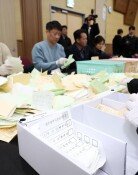Defending the 4-River Project
South Jeolla Province Gov. Park Joon-young said, The four-river restoration project is a political battle but the Yeongsan River restoration project is a local project that should not be sidelined because of political logic. Nobody objected to the Yeongsan River project between 2004 and 2006, and his comment is a declaration of conscience testifying to the political aspects of the objections to the four-river project. Park said he does not want to ally himself with elected mayors or governors who want to stop or revise the four-river project. He seems firm in his conviction that the project will improve with government support the water quality of the river, which is not suitable even for agricultural purposes.
Main opposition Democratic Party Chairman Chung Sye-kyun said Monday, Park seems to have made the wrong judgment. I dont object to a water treatment project, but it is wrong to consider opposition to the four-river project as a political issue. Chung added, It is a national demand that the four-river project is never acceptable. The national demand is a less-than-convincing political rhetoric at a time when party legislators with constituencies in South Jeolla Province as well as Park support the Yeongsan project.
It is also nonsense to claim that people want to stop the project just because opposition candidates were elected to head upper-level provincial governments. Park said he would continue the Yeongsan project as scheduled in his election campaign, and was elected to a third term with an approval rating of 68.3 percent. In South Gyeongsang Province, though the elected person of the upper-level government was an independent, 11 were from the ruling Grand National Party among 18 elected leaders of lower-level governments. In Gangwon Province, though the elected person in the upper-level government was from the Democratic Party, 10 of the 18 lower-level government leaders were from the ruling party. Certain ruling party supporters oppose the four-river project while other Democratic Party supporters are in favor. The outcome of local elections should not be misunderstood as a yes or no vote on the project. The River Act clearly draws the line between state responsibility for preservation and management of the countrys four major rivers and local responsibility of finding necessary measures under the national plan and setting up detailed plans appropriate for the districts concerned.
At the end of this year, 60 percent of the river restoration project will be completed. Opposition party members, religious groups and social bodies criticize the project as harmful to the environment, but not cleaning up a huge sewage-like river is tantamount to environmental destruction that lowers quality of life. Gov. Park is representing the opinions of his constituents.
For its part, the government must tackle side effects in construction in certain areas, such as piling up earth for reclamation on farmland, while flexibly responding to criticism that the process of the project is one-sided, even if forced to slow down a bit.







